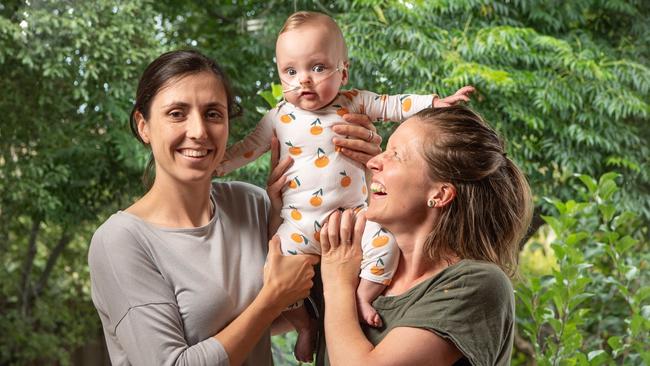Murdoch Children’s Research Institute study: Covid rule hurt mums, bubs
A Melbourne-led study has revealed the effect of hospitals forcing Covid-positive mothers to be separated from their newborns.

News
Don't miss out on the headlines from News. Followed categories will be added to My News.
Mothers who give birth while Covid-positive should not be separated from their newborns, new research suggests, after a Melbourne-led study found isolation was of more risk to babies.
Researchers found more than 70 per cent of babies who were separated from their mothers had to be admitted to a neonatal intensive care unit or special care nursery despite having no symptomatic or underlying condition to require admission.
In comparison Covid transmission from mother to baby was rare.
The international study, led by Melbourne’s Murdoch Children’s Research Institute, involved more than 690 babies born to mothers with Covid – including at Victorian hospitals – from 10 different countries.
More than half of those babies were separated from their mother — 93 per cent of whom had no physical contact with their mother before they were removed.
The study, published in The Lancet’s eClinicalMedicine, found breastfeeding rates were also low at 53 per cent, though in the early months of the pandemic it was just 23 per cent.
Murdoch Children’s Professor David Tingay said hospitals should “absolutely” prioritise mother and baby contact, and hopes lessons from this pandemic are applied in future outbreaks.
“Only five per cent of babies with a mother positive for SARS-CoV-2 contracted Covid,” he said.
“For that small number of babies, most of them thankfully had a very mild infection.”
Skin to skin contact is about much more than a special moment for parents.
Prof Tingay said data from the last decade had consistently shown even the most vulnerable of babies – in intensive care – had better short and long term outcomes when their parents could hold them.
“It is possible to support both good and safe infection control protocols and promote and encourage family-centred care,” he said.
Murdoch Children’s Dr Georgie Dowse said being held allows babies to “adjust to life outside the womb” and helps mothers develop that important mother-baby bond and initiate breastfeeding.
“Breast milk provides the perfect nutrition for babies to grow and protects both mother and baby against illness,” she said.
“The greatest impact for babies born in the pandemic may be felt later in the future.”
Geelong mum Shannon Trenwith said it was “agonising” when she and her partner Kimberly Spragg contracted Covid after leaving hospital and were separated from their baby.
“We wanted to do the little things – like holding her hand and reading her books,” she said.
“We just cried and cried.”
While they understood why they couldn’t see Agnes – who was born at 23 weeks and very vulnerable – she said she would have fought to see her if she was a healthy, full-term baby and hopes this research empowers other families.
“Families with newborns shouldn’t be forgotten when infection controls are being reviewed.”
Originally published as Murdoch Children’s Research Institute study: Covid rule hurt mums, bubs




